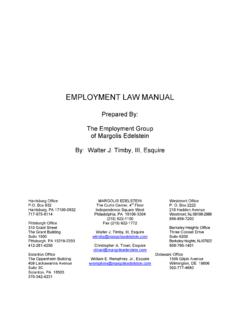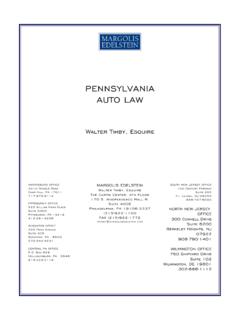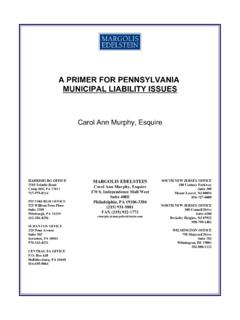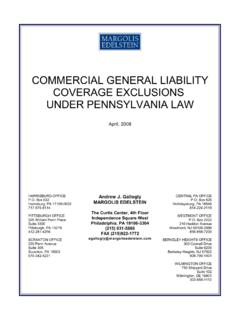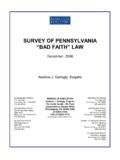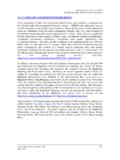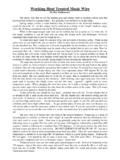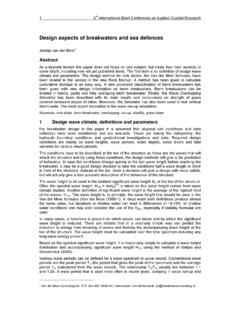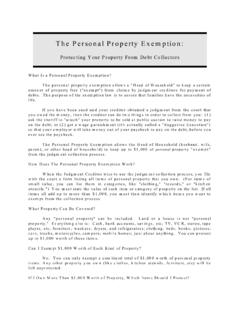Transcription of ARBITRATION IN PENNSYLVANIA - Margolis Edelstein
1 ARBITRATION IN PENNSYLVANIAJune, 2006 Andrew J. GalloglyHARRISBURG Box 932 Harrisburg, PA 17106-0932717-975-8114 PITTSBURGH OFFICE310 Grant StreetThe Grant BuildingSuite 1500 Pittsburgh, PA 15219-2203412-281-4256 SCRANTON OFFICEThe Oppenheim Building409 Lackawanna AvenueSuite 3 CScranton, PA 18503570-342-4231 Margolis EDELSTEINA ndrew J. Gallogly, EsquireThe Curtis Center, 4th FloorIndependence Square WestPhiladelphia, PA 19106-3304(215)922-1100 FAX PA Box 628 Hollidaysburg, PA 16648814-224-2119 WESTMONT Box 2222216 Haddon AvenueWestmont, NJ 08108-2886856-858-7200 BERKELEY HEIGHTS OFFICET hree Connell DriveSuite 6200 Berkeley Heights, NJ 07922908-790-1401 WILMINGTON OFFICE1509 Gilpin AvenueWilmington, DE 19806302-777-46801 IntroductionThe ARBITRATION of claims can take several different forms in PENNSYLVANIA ,but can be generally categorized as either compulsory judicial ARBITRATION (mandated by court rules with respect to civil suits in which the damagesallegedly at issue are less than a prescribed dollar amount)
2 Or contractualarbitration (in which the parties have previously agreed to arbitrate their disputesoutside of the judicial system). Compulsory judicial ARBITRATION was created as a means of efficientlydisposing of smaller civil cases and conserving judicial resources by requiring as afirst step that such cases be tried before a panel of three local court-appointedattorneys, with the understanding that any party can later appeal from thedecision and obtain a new trial. Contractual ARBITRATION is a means of bypassing the judicial system and isvoluntary in the sense that the parties have entered into an agreement to resolvesome or all their disputes in that fashion. Where claims are subject to contractualarbitration, there is generally no right to a new trial before the courts and theextent to which judicial review is available to set aside legal errors by thearbitrators depends upon whether the terms of the contract call for common lawarbitration, for ARBITRATION under the Act of 1980, or for ARBITRATION under the Actof 1927.
3 Compulsory Judicial ARBITRATION The PENNSYLVANIA Judicial Code contains provisions authorizing each JudicialDistrict in the Commonwealth to adopt rules calling for the compulsory arbitrationof civil cases at 42 7361, and most, if not all state courts have nowadopted such programs, which have proven very successful in expediting the trialand disposition of civil cases. The Judicial Code language is essentially only an enabling statute, leaving it to the Supreme Court of PENNSYLVANIA to adoptappropriate Rules of Civil Procedure and the local Common Pleas courts to adopttheir own consistent Local Rules. The statute does, however, set the basicparameters with respect to the types of cases to be submitted to ARBITRATION basedupon the amount of damages claimed.
4 The Code also establishes the automaticright of any dissatisfied party to appeal from the ARBITRATION award and to demand2a trial de novo, after which the case will ultimately be assigned for trial to a judge(and a jury where requested) thus avoiding any claim that such compulsoryarbitration proceedings would violate a litigant s Constitutional right to a trial byjury. The outcome of a judicial ARBITRATION proceeding is, in that sense, non-binding provided a timely appeal is that regard, the enabling language of the Judicial Code indicates that,where prescribed by general rule or rule of court, civil matters or issues thereinas shall be specified by rule shall first be submitted to and heard by a board ofthree members of the bar of the court , after which the statute states thatarbitration is not permitted with respect to any action involving title to realproperty and then establishes the basic guidelines as to the jurisdictional limits forarbitration.
5 Stating that no matter may be referred to ARBITRATION where theamount in controversy, exclusive of interest and costs, exceeds either $50,000 (inlarger judicial districts embracing first, second or third class counties, or homerule counties) or $35,000 (in any other judicial district.) The jurisdictional limitsof compulsory ARBITRATION in the PENNSYLVANIA state courts vary considerably with,for example, all cases involving up to $50,000 being referred to ARBITRATION inPhiladelphia, Montgomery, Lehigh, Bucks, and Lancaster Counties, whereas thelimit is set at $35,000 in Dauphin County, $30,000 in York and Lackawanna Countiesand surprisingly only $25,000 in Allegheny County despite the size of that judicialdistrict based in of ArbitratorsThe PENNSYLVANIA Rules of Civil Procedure governing compulsory arbitrationgenerally provide for a list of available arbitrators to be compiled in a manner tobe prescribed by local county rule from attorneys actively engaged in the practiceof law primarily in the judicial district in which the court is located, that the boardof arbitrators is to consist of a panel of three such attorneys chaired by one havingat least 3 years experience at the bar.
6 The Rules also require that each arbitratortake an oath of office, state that no board shall contain more than one attorneyfrom the same firm, and call for the withdrawal of any arbitrator where thecircumstances are such that a judge would be disqualified from hearing the case[ No. 1302].3 Scheduling of HearingsThe state rules leave it to the local rule making power of the countyCommon Pleas courts to establish procedures for fixing the date, time and placeof ARBITRATION hearings, provided that no less than 30 days written notice is givento the parties or their attorneys of record [ No. 1303]. Procedures for setting hearing dates do vary widely in PENNSYLVANIA by localpractice, with some judicial districts, such as Philadelphia, automatically assigningan ARBITRATION hearing date on the date any suit identified as an ARBITRATION matteris filed, either by complaint, or writ of summons, setting the hearing to take placeapproximately 9 months later and stamping the hearing date on the suit papersthemselves.
7 In Pittsburgh (Allegheny County) no date is assigned if the suit is filedby writ of summons only, but a hearing date will be assigned automatically uponthe filing of the plaintiff s complaint. Under the local rules of some counties, the courts do not automatically fixa date for ARBITRATION and generally do not set hearing dates until they are askedto do so. For example, ARBITRATION hearings in Bucks, Lancaster and York Countiesare not scheduled until a party files a praecipe to place the case on the arbitrationlist or a judge orders that a case be referred to ARBITRATION . In Lehigh County, thelocal rules provide for cases to be listed for ARBITRATION hearings upon the filing ofa praecipe by any party, but also allow adverse parties to demand an additional120 days in which to complete discovery unless the case has been pending one yearor more.
8 In Montgomery County, the local rules provide for the scheduling ofhearings upon the filing of a praecipe for ARBITRATION , but require that anarbitration praecipe be signed by all counsel and unrepresented parties and thata court conference be scheduled to address the issue if anyone refuses to sign. InHarrisburg (Dauphin County) no hearing date is set until one of the parties files acertificate of readiness and that party must give the other parties 30 days noticeof his intent to do so, after which a hearing date is set by the chairman of thepanel, rather than by the consequence of local rules such as those in Philadelphia and Pittsburghwhere hearing dates are assigned automatically by the courts either immediatelywhen a lawsuit is filed, or soon after, is that the parties are allowed only a limitedperiod of time in which to complete discovery prior to ARBITRATION and that periodcan become even more limited when there are delays in effectuating service of4the suit papers upon the defendants.
9 To ensure that adequate time is available forthe completion of necessary discovery in such cases, it is imperative that suits bepromptly assigned to defense of HearingsWith regard to procedure at hearings, Rule 1304 states that, except asotherwise provided, the arbitrators shall conduct the hearing in conformity withRule 1038, governing non-jury trials. However, consistent with the purpose of providing a quick and cost-effectivemeans of disposing of smaller cases, Rule 1305 then relaxes evidentiary standardsin order to permit the parties to present certain evidence in documentary formwhich would ordinarily require live testimony. Probably the most significantprocedural aspect of the ARBITRATION rules is that they allow for theintroduction such things as damage estimates, lost earnings documentation,bills, and expert testimony in the form of written reports, rather than forcingparties to incur the expense of presenting witnesses to authenticate suchdocuments or live expert testimony, provided notice of the intent to offerthe reports and copies of the reports are provided to opposing counsel atleast 20 days prior to the hearing.
10 Specifically, Rule 1305 permits the followingdocuments to be admitted: bills or other documents evidencing charges incurred; records of businesses, government departments, agencies or offices,subject to statutory restrictions, provided they would be admissible in evidenceif authenticated by a records custodian; records and reports of hospitals and licensed health care providers; expert reports and s; written estimates of value, damage to, cost of repair of or loss of property(if accompanied by a statement of the party offering it as to whether the propertywas repaired and, if so, whether repairs were made in full or in part and by whom,with a copy of the bill); 5 documentation of lost earnings in the form of written reports prepared byemployers of earning rates, lost time from work or lost with the parties right to appeal for a trial de novo if unhappywith the award, the Rules state that no hearing transcript will be prepared unlessa party does so at his own expense.
